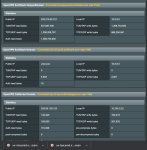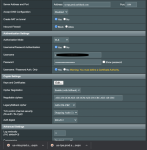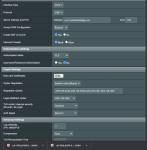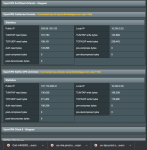Hi all. So for about 3 years now I have been using a VPN called VPN Unlimited. I got a lifetime subscription for like $30 on StackSocial one time. The performance is below what I'd like, but for $30 for lifetime subscription I can't complain. They only have one US-based server that allows torrents, in San Francisco. So I have a VPN client profile set up to use that server, and I have several LAN clients set to route through that VPN. I have VPN Kill-switch 'ON' for this profile. I have a second profile that uses a different server, for devices like my smart TVs and Nest Thermostat. The VPN kill-switch is set to 'OFF' for this profile. Both of these VPNs can be on and active at the same time. I get an IP from both VPNs and my devices routed through each one generally have no issues.
The speeds of the VPN are about 10% or lower my actual wired Internet speed.
Enter SurfShark.
I just purchased SurfShark today (30 day money back guarantee so hopefully I can figure this out before then or else I might cancel). Running speed tests I am getting drastically faster speeds with SurfShark when compared to VPN Unlimited. Plus, I think SurfShark allows P2P traffic on all of it's servers.
Here's my big issue. I can't have two VPN client tunnels running at the same time with SurfShark. I created one profile for Tampa (Kill-switch on) and one for Miami (kill-switch off). If one profile is on, I get a public IP from the VPN server and everything works. If I try and start the second one, it never gets an IP address. I went to SurfShark support through Livechat and the guy was telling me that it should work. He was asking me if I had tried TCP instead of UDP, and if I had tried different protocols. I wanted to come here and see if anyone has experience with SurfShark. I went with them because they are getting a lot of attention and great reviews with good pricing. I was considering ExpressVPN but their pricing and their 5 device limit turned me off.
Any one here have experience with SurfShark? I'm liking the faster speeds, but if I can't have two VPN clients connect at the same time then I'll be very disappointed.
I can post screenshots of configurations and system logs here if needed. One thing I did notice for sure was when I import the ovpn file for SurfShark, they seem to use different authentication that VPN Unlimited.
SurfShark uses TLS Authorization with username and password, and "Username and Password Auth. Only" set to "Yes"
VPN Unlimited uses TLS Authorization without a username or password.
I'm thinking maybe SurfShark doesn't allow two connections from the same device since the username and password are the same? Just a thought.



The speeds of the VPN are about 10% or lower my actual wired Internet speed.
Enter SurfShark.
I just purchased SurfShark today (30 day money back guarantee so hopefully I can figure this out before then or else I might cancel). Running speed tests I am getting drastically faster speeds with SurfShark when compared to VPN Unlimited. Plus, I think SurfShark allows P2P traffic on all of it's servers.
Here's my big issue. I can't have two VPN client tunnels running at the same time with SurfShark. I created one profile for Tampa (Kill-switch on) and one for Miami (kill-switch off). If one profile is on, I get a public IP from the VPN server and everything works. If I try and start the second one, it never gets an IP address. I went to SurfShark support through Livechat and the guy was telling me that it should work. He was asking me if I had tried TCP instead of UDP, and if I had tried different protocols. I wanted to come here and see if anyone has experience with SurfShark. I went with them because they are getting a lot of attention and great reviews with good pricing. I was considering ExpressVPN but their pricing and their 5 device limit turned me off.
Any one here have experience with SurfShark? I'm liking the faster speeds, but if I can't have two VPN clients connect at the same time then I'll be very disappointed.
I can post screenshots of configurations and system logs here if needed. One thing I did notice for sure was when I import the ovpn file for SurfShark, they seem to use different authentication that VPN Unlimited.
SurfShark uses TLS Authorization with username and password, and "Username and Password Auth. Only" set to "Yes"
VPN Unlimited uses TLS Authorization without a username or password.
I'm thinking maybe SurfShark doesn't allow two connections from the same device since the username and password are the same? Just a thought.





